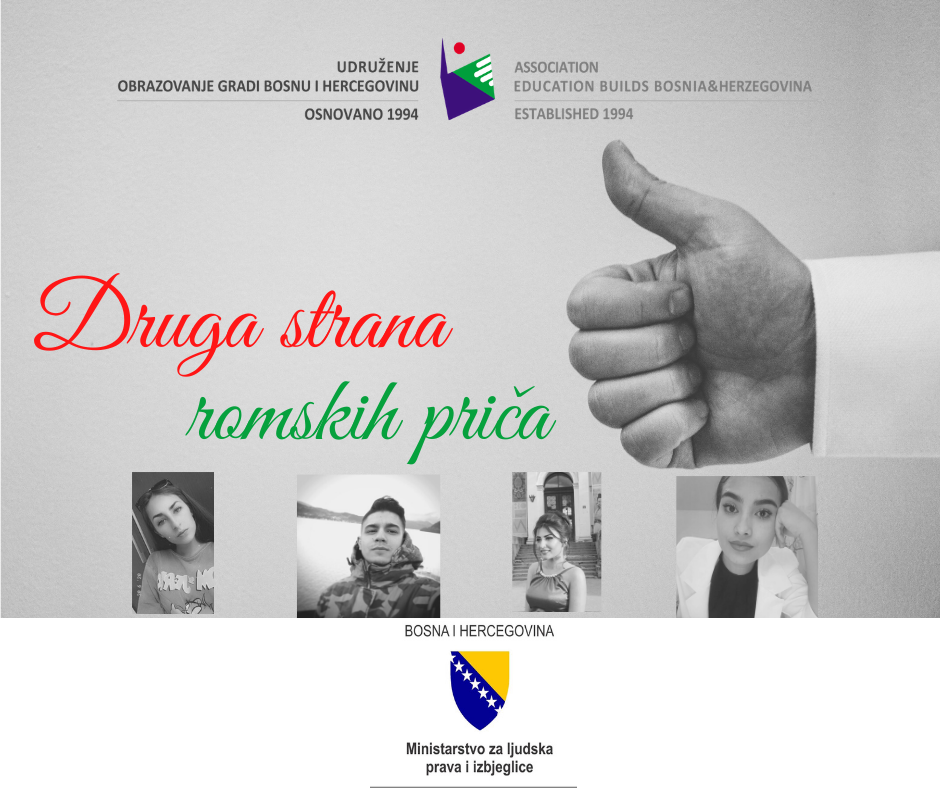The other side of Roma stories: Selma Zahirović

You must have already seen Selma Zahirović somewhere. If not on small screens during a report, then certainly as an activist in non-governmental organizations and associations. Selma is our miracle from, now somewhat adult, a successful child.
The scholarship holder of the Association, who comes from Sarajevo, at whose University she studies at the Faculty of Political Sciences, is the final year of her undergraduate studies in Social Work. Selma is ambitious, smart and hardworking. She has clearly defined goals, but it is not a problem for her even if the circumstances turn her away from them.
“After finishing high school, I made the decision to study firmly and exclusively for one vocation, it was a matter of psychology. Nowhere else, except there, did I apply for enrollment. Unfortunately, I was not on the list of accepted students and that disappointed me a lot, because I placed my hopes in a high number of points according to the excellent success and good average. In the second term, I decided to apply for enrollment in a field that is related to that field of science. Fortunately, although it was the second deadline and a large number of students had already been admitted, my name was on the list of regular students. Therefore, social work is not my first choice and it is not something I have always wanted to do, but I would certainly do it with equal love if I have the opportunity to do so in the future. ”
She says that she had a beautiful childhood, and that many memories are connected to primary school.
That it is b&h society nevertheless wrote beautiful stories just Selma states. Her friends, as well as the environment in which she spent her earliest youth, do not care about national, religious or any other differences.
“I attended the Džemaludin Čaušević Elementary School, I would say that one of the reasons why I have only had a good experience from the very beginning related to the nation to which I belong and education, is that institution. They have always been very accommodating, considerate and considerate towards our minority. From free textbooks, snacks, financial assistance in paying for trips and excursions, to human and equal access to all students, these are all works that made my primary schooling easier and significantly more beautiful. I did not have bad experiences with my peers, I believe that my case is not a reflection of other students belonging to the Roma national minority, but I am here to speak for myself. There was no teasing or discrimination on any grounds. Also, during high school and elementary school, everything that that part of me brought me was actually beautiful and absolutely useful. As the most important, I would like to single out the Association Education Builds BiH, with which I grew, matured and there, when it comes to learning, I learned the most important thing – how to be human. No matter how simple it may sound today, it is the hardest thing to be. ”
Still, Selma cautiously warns that she is just one of the lucky ones when it comes to peer violence. Members of the Roma national minority are especially exposed and that is why he emphasizes the importance of this topic and talks about it whenever he has the opportunity.
“Personally, I have not had any experience with discrimination, but I am certainly aware that this is not always the case.
Many Roma children do not have basic living conditions, therefore they do not have the necessary for a healthy education, starting from clothes, shoes, which can expose them to peer teasing, violence, then they do not have the financial means to provide textbooks, school supplies, without which schooling is almost complete. so impossible, and many other examples arising from poverty can often be a cause of discrimination. It is clear that the Roma are accompanied by a lack of education, both because of the above, and because of the failure of Roma in the face of the challenges that education brings to them. I think it is very important to change the awareness that education is foreign to that nation, armed with labels and fear, they see the future without a future. “
Her family is very important and she is attached to her closest ones. They celebrate the holidays together, and their closest friends complete the atmosphere. However, little of this relates to customs that are characteristic of members of the Roma national minority.
“For me, happiness is reflected in a healthy, harmonious and beloved family. My immediate family members are the people who make me truly happy, if they are good, everything else will be sorted out somehow.
Since my family has never nurtured the tradition of our nationality much, apart from celebrating certain holidays, it usually doesn’t differ much. But even if it is different, I am sure that friends would be happy to enjoy these differences with us. As before, I don’t think my nationality will bring me anything bad, just nice things and additional recognition. “
About education
To Selma her education is a priority, she keeps the average in college extremely high, speaks English, and upgrades her knowledge whenever the opportunity arises.
“Education is the key to upgrading, the way to find the right and valuable way, the importance of this life process is reflected in the fact that the knowledge that awaits us to absorb it at the same time we know and use it. Therefore, education is important, but for working in any profession, experience is much more important, to be experienced in something that involves a lot of learning, commitment and knowledge. Through education we are just doing the same three things, preparing for the practical part where we gain that experience without which everything and having all the knowledge of the world we walk in unfamiliar terrain. “
Her own nature motivates her to work and study. Selma describes herself as a workaholic. She is a full-time student, works in one of the largest and most recognized TV companies in our country, volunteers and is always at the service of people who need her. She told us that she loves her job and that she would be happy to stay there after her studies. She says that her job as a producer is exactly as described for her, although writing and researching stories is not foreign to her. We asked her how all the obligations come from.
“Of course, sometimes it is difficult to reconcile all obligations, but with good organization and realistically set goals and priorities, anything is possible. My motivation lies in accomplishing as much as I can, I don’t set myself too ambitious tasks, but success is measured by nothing but a sense of satisfaction. I have been working since I was fifteen, and on holidays I always found seasonal jobs that would bring me some pocket money in addition to my experience. I have always managed to find a way to achieve the desired average in school, college and at the same time work, volunteer and try to be active. “
Selma loves her country and her city. She says she has no plans to leave BiH, despite the current poor economic situation.
Although the state and the system give countless reasons to look for my happiness somewhere and to pass on everything I gain in this country to others, I still hope and believe that it is possible to live decently and happily in Bosnia and Herzegovina. The warmth of the people and the feeling of belonging are just a part of what, I am sure, would make my life anywhere else quite difficult. I just decided to believe that my effort and work would pay off wherever I was, and if I can already choose, let it be the country where I grew up. I really love this city, its buildings and especially its natural beauty. The spring of Bosnia delights me every time I visit it as if I always have something new to see. But I will still single out the Bazaar, part of the Ottoman construction, I loved the cobblestones and irregularly stacked stones, I’m very sorry because now there are slabs that I think fit much less. Low roofs, wooden, small shops, the smell of bazaar dishes and the sounds of church bells and call to prayer, who is not touched by such a scene?“
Selma’s advice
“I will try to express my “advice” or at least interest those who will read this in one message, a question I ask myself whenever I am in doubt about important things in life.
Imagine for a moment that you are much older than you are now, your whole life is behind you, looking back and wondering “Did I do everything I could to be satisfied with the picture I see today” ?! That word “everything” sounds scary, but it implies things like just choosing to educate ourselves, to upgrade, to work on ourselves and it can just seem scary at times, but it’s important to face the fear and find a way to overcome it. So whenever you find yourself in a situation where you choose whether to apply for this job, whether to enroll in this course, whether to go to this interview, you are just wondering about one of those things from the “everything” section, try it! The loss is bigger anyway, if you don’t try.“
We asked Selma how the NGO sector can help children and young people to be successful and to believe in themselves.
“The non-governmental sector, more precisely the Association of OGBiH, is exactly what awakened in me all the desire to work, volunteering, the feeling that you are doing something good, humane, useful, acquaintances you gain, experience, all these are things that help you be a better person , and therefore more successful. It is an organization that has shown me what true altruism means, I have learned how activism is valued and results are not measured by what we get in return in a material but in a spiritual sense. There are usually people in the non-governmental sector who will practically and much better present all that I have tried to say. So the best answer to this question is, just be a part of that sector and see for yourself how much good it will bring you.“


